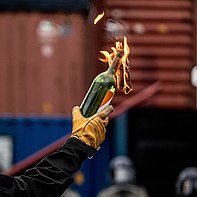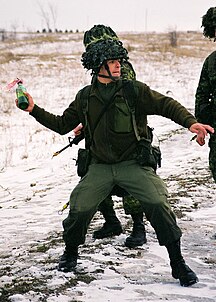
Back Molotofbom Afrikaans مولوتوف (سلاح) Arabic Cóctel molotov AST Molotov kokteyli Azerbaijani مولوتوف کوکتلی AZB Кактэйль Молатава Byelorussian Кактэйль Молатава BE-X-OLD Коктейл Молотов Bulgarian মলটভ ককটেইল Bengali/Bangla Còctel molotov Catalan
- Top left: Lit Molotov cocktail ready to be thrown in practice of the Dutch National Police Corps in 2021
- Top right: Use of Molotov cocktails during the Euromaidan rioting in Ukraine in 2014
- Lower left: Canadian Armed Forces practice throwing practice in 2007
- Lower right: Original Finnish Molotov cocktail with storm match attached in Finland
A Molotov cocktail (among several other names – see § Etymology) is a hand-thrown incendiary weapon consisting of a frangible container filled with flammable substances and equipped with a fuse (typically a glass bottle filled with flammable liquids sealed with a cloth wick). In use, the fuse attached to the container is lit and the weapon is thrown, shattering on impact. This ignites the flammable substances contained in the bottle and spreads flames as the fuel burns.
Due to their relative ease of production, Molotov cocktails are typically improvised weapons. Their improvised usage spans criminals, gangsters, rioters, football hooligans, urban guerrillas, terrorists, irregular soldiers, freedom fighters, and even regular soldiers; usage in the latter case is often due to a shortage of equivalent military-issued munitions. Despite the weapon's improvised nature and uncertain quality, many modern militaries exercise the use of Molotov cocktails.[1][2][3]
However, Molotov cocktails are not always improvised in the field. It is not uncommon for them to be mass-produced to a certain standard as part of preparation for combat. Some examples of this being done are the anti-invasion preparations of the British Home Guard during World War II[citation needed] and the Ukrainian volunteer units during the 2022 Russian invasion of Ukraine[citation needed]. During World War II, Molotov cocktails were even factory produced in several countries, such as Finland,[4] Nazi Germany,[5][6] the Soviet Union,[5] Sweden,[7][8] and the United States;[9] some featuring specially designed frangible containers and fuses[5][6] (such as the US Frangible Grenade M1 for example).[9]
- ^ "Molotov Cocktails, Canadian Style". www.military.com. Canadian Army. 21 February 2012. Retrieved 12 April 2022.
- ^ Soldatens handbok 2020 (PDF) (in Swedish). Helsinki, Finland: Finnish Defence Forces. p. 165. Archived from the original (military handbook) on 27 September 2022. Retrieved 12 April 2022.
- ^ Sotilaan käsikirja 2020 (PDF) (in Finnish). Helsinki, Finland: Finnish Defence Forces. p. 165. Archived from the original (military handbook) on 27 September 2022. Retrieved 20 April 2022.
- ^ Cite error: The named reference
ilkkawas invoked but never defined (see the help page). - ^ a b c "Немецкий 'коктейль Молотова'". копанина.рф. Archived from the original on 26 June 2022. Retrieved 20 April 2022.
- ^ a b "The German version of the Molotov coctail". bunkersite.com. Archived from the original on 6 December 2022. Retrieved 20 April 2022.
- ^ Cite error: The named reference
amreg A42was invoked but never defined (see the help page). - ^ Cite error: The named reference
amreg A44was invoked but never defined (see the help page). - ^ a b "M1 Incendiary, Frangible". lexpev.nl. Archived from the original on 27 September 2022. Retrieved 20 April 2022.



